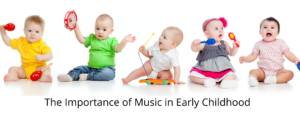Music can bring so much joy to a child’s life that it is a wonderful gift just by itself. Music also has the most “fringe benefits” of all the art forms and activities that you could give your child.
Early childhood music classes don’t just provide a good musical foundation that helps children excel when they start playing an instrument. Classes also focus on the developmental needs of children, giving them tools to understand and express feelings, to connect movement to language, and to manage energy and emotion. Music classes also help prepare students for school, provide opportunities to develop social skills, and encourage creativity.
Childhood Development
Listening to music, and musical movement activities are wonderful play experiences for a child. These activities can help children make connections between the world of movement and sound, with the inner world of feelings and observation. They can aid in physical fitness, balance, coordination and movement abilities as well as help develop fine motor skills and hand-eye coordination. Music classes work with rhythm and beat to strengthen a child’s sense of rhythm, and provide dramatic opportunities for children to create their own graceful movements as they work with scarves or ribbons.
A well-designed Early Childhood Music program will also carefully imbed quiet songs and activities throughout the lesson, helping a child learn to relax and be in control by transitioning from movement to stillness, excitement to calmness. Musical activities that build suspense through slight pauses, stop and start cues, or anticipation of a favourite sound or movement help children learn to wait, and to control their impulses.
Being Ready for School
Musical play activities can help children develop language skills such as patterns, rhythm and rhyme, differences in sound, and critical listening. They can help children understand the concept of opposites such as high/low, fast/slow, in/out, stop/go. Participation in musical activities can aid in memory development. The sensory-motor integration that takes place as children come to understand the vocabulary of movement skills such as hop, jump, run, twirl, gives them a distinct advantage when they begin school.
Music classes also work on a wide range of other skills that prepare children for school. They develop the ability to sit still and listen, to share and to take turns. Children discover that they can have an impact on the events in class and develop the confidence to speak up. Working on the mastery of musical songs and games leads to the understanding that mistakes are a natural part of learning. Discovering how to deal with mistakes in music class can help develop the self-discipline to succeed in all academic endeavours.
Musical activities address language development, but also surprisingly address a great number of “pre-reading” or “reading readiness” skills:
- the ability to hear and identify differences in pitch
- the ability to work with codes (linking letter sounds with letter shape is similar to linking musical tones with notes)
- familiarity with rhyming words and the ability to hear which words rhyme
- a rich vocabulary of regular and “rare” words
- the ability to focus attention on a picture or on a teacher’s voice, and to communicate well.
Creativity
Creativity calls for a special kind of intelligence, one that gets lost in our quest for factual information, the ability to recall correct answers and to do well on tests. To be creative, one is challenged to come up with new ideas, to solve problems that have more than one answer, to understand the form but be able to think outside the box and combine things in new ways. Music class is the perfect place to work on these creative skills.
Musical activities in Early Childhood Music classes are filled with opportunities for improvisation. There are open-ended songs that ask the children to supply a word or phrase, movement games where they are able to change the activities in the song, and substitution songs where children change the story. They learn to vary pitches, rhythms, dynamics, and tempo. By learning to delight in fresh ideas, they learn to recognize form and improvise on it.
Readiness to Learn an Instrument
In a well-designed Early Childhood Music program, a teacher will work on the foundation skills that allow a child to flourish in instrumental or vocal lessons, and will help develop a greater understanding of music that can lead to a life-long pleasure in musical activities. This includes the ability to keep a steady beat, to recognize and repeat patterns, and to be creative. Success, however, depends on the willingness to practice.
Young children delight in repetition and naturally have a passion for practicing … they will want to continue with an activity long after an adult has lost patience for it! Children will stick with a task if they want to master it, and will experience great joy when they do. If children develop a sense of musicality before beginning to focus on an instrument, they will bring a love of practice to their relationship with that instrument. The success they experience with that practicing is something they will want to replicate in all areas of life.

